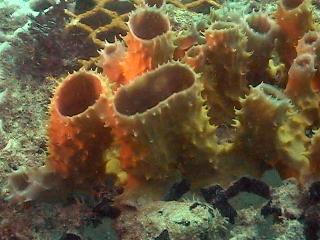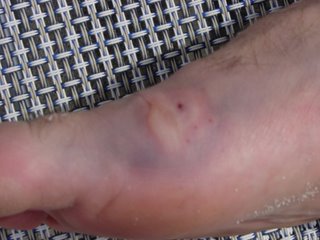Diving After Head Injury
A diver recently wrote asking about return to diving after having had a bang in the head in an automobile accident. He was briefly unconscious, had no memory loss and had not had any seizures. He was observed overnight in the ER and allowed home with negative studies to be followed by his family physician.
What Are the Problems Posed by a head injury in a diver?
Head injury generally poses two main problems with diving: post-traumatic epilepsy and changes in cognitive status.
Diving may be resumed or started after head injury if:
1.) No drugs are required
2.) There has not been loss of consciousness greater than 30 minutes
3.) There are no localizing signs
4.) There has not been amnesia longer than one hour.
What About Drugs?
Anticonvulsants should not be used with diving as they are all sedating and potentiate the effect of nitrogen narcosis, leading to disorientation at unexpectedly shallow depths. Diving may be resumed three months after the cessation of anticinvulsants without seizure activity.
What do others have to say about diving and head trauma?
Divers Alert Network has several articles about diving with head trauma. One of these is in DAN FAQ about head trauma at http://www.diversalertnetwork.org/medical/faq/faq.asp?faqid=76
Another article in the DAN website by Dr. Hugh Greer (dec.) is located at http://www.diversalertnetwork.org/medical/articles/article.asp?articleid=15
The British SubAqua Club have this to say about head trauma and diving:
BS-AC recommendations: “The length of post traumatic amnesia (PTA) including any period of unconsciousness may be used as an index to the severity of injury. Where PTA has been less than one hour, there should be a three week layoff from diving. With PTA of an hour to 24 hours, there should be a two month layoff. Where the period of PTA exceeds 24 hours, there inevitably has been severe brain damage and there is considerable likelihood of subsequent epilepsy and impaired mental functioning. A minimum period off diving of three months is suggested and cerebral function should have returned to normal.
If epilepsy should have developed as a result of injury then further diving is banned unless it was an isolated fit occurring at the time of injury. Likewise if anticonvulsant medication is being taken as a prophylactic measure, diving should be banned, but may be resumed three months after this is withdrawn if the individual never had a seizure.
Operative intervention to raise depressed bone or evacuate haematomas should disqualify for three months but otherwise may be disregarded except insofar as it may be associated with subsequent fits, anticonvulsants treatment or other factors above.”
Get the approval of your physician
You should be able to dive if you have
—the approval of your physician,
—have not had seizures
—have not had a reduction in your ability to perform the task-loading required in safe diving, self-rescue and rescue of your buddy
—and have been off medication as described above.
=========================================================
What Are the Problems Posed by a head injury in a diver?
Head injury generally poses two main problems with diving: post-traumatic epilepsy and changes in cognitive status.
Diving may be resumed or started after head injury if:
1.) No drugs are required
2.) There has not been loss of consciousness greater than 30 minutes
3.) There are no localizing signs
4.) There has not been amnesia longer than one hour.
What About Drugs?
Anticonvulsants should not be used with diving as they are all sedating and potentiate the effect of nitrogen narcosis, leading to disorientation at unexpectedly shallow depths. Diving may be resumed three months after the cessation of anticinvulsants without seizure activity.
What do others have to say about diving and head trauma?
Divers Alert Network has several articles about diving with head trauma. One of these is in DAN FAQ about head trauma at http://www.diversalertnetwork.org/medical/faq/faq.asp?faqid=76
Another article in the DAN website by Dr. Hugh Greer (dec.) is located at http://www.diversalertnetwork.org/medical/articles/article.asp?articleid=15
The British SubAqua Club have this to say about head trauma and diving:
BS-AC recommendations: “The length of post traumatic amnesia (PTA) including any period of unconsciousness may be used as an index to the severity of injury. Where PTA has been less than one hour, there should be a three week layoff from diving. With PTA of an hour to 24 hours, there should be a two month layoff. Where the period of PTA exceeds 24 hours, there inevitably has been severe brain damage and there is considerable likelihood of subsequent epilepsy and impaired mental functioning. A minimum period off diving of three months is suggested and cerebral function should have returned to normal.
If epilepsy should have developed as a result of injury then further diving is banned unless it was an isolated fit occurring at the time of injury. Likewise if anticonvulsant medication is being taken as a prophylactic measure, diving should be banned, but may be resumed three months after this is withdrawn if the individual never had a seizure.
Operative intervention to raise depressed bone or evacuate haematomas should disqualify for three months but otherwise may be disregarded except insofar as it may be associated with subsequent fits, anticonvulsants treatment or other factors above.”
Get the approval of your physician
You should be able to dive if you have
—the approval of your physician,
—have not had seizures
—have not had a reduction in your ability to perform the task-loading required in safe diving, self-rescue and rescue of your buddy
—and have been off medication as described above.
=========================================================




.jpg)
